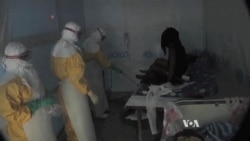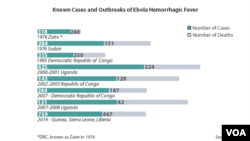Health ministers from across West Africa are attending an emergency conference in Ghana to discuss the regional outbreak of Ebola virus disease. The World Health Organization says the highly infectious disease has killed more than 400 people in Guinea, Liberia and Sierra Leone.
In Sierra Leone police and medical workers man checkpoints on the outskirts of Kenema -- the site of an Ebola outbreak that is spreading across West Africa.
Authorities are forcing people to test for the disease. Some victims try to avoid detection, preferring to die in secret.
The outbreak is the worst since the disease was identified in the 1970s, according to Peter Piot, director of the London School of Hygiene and Tropical Medicine.
"The outbreak in West Africa is unprecedented in the history of Ebola outbreaks because it involves three countries, at least, capital cities, multiple sources, and that will make it far more difficult to control," he said.
Ebola causes fever, vomiting, bleeding and diarrhea. It is spread through contact with the blood or other fluids of infected people.
Misinformation, porous borders
Doctors say a lack of understanding is contributing to its rapid spread. Porous borders between the affected countries also make it difficult to contain.
Dr. Shek Moar Khan of Kenema Government Hospital in Sierra Leone said families often bury victims without telling anyone.
“By the time people are dead with the Ebola, they are more infectious than ever. So if they take care of their burial on their own, 10 more will be infected,” said Khan.
In neighboring Liberia, nurse Elizabeth Smith lies bleeding on a hospital bed. She contracted the Ebola virus from her patients. Her colleagues are doing what they can to help; but her chances of survival are about 10 percent.
Sense of urgency
District health officer Philip Azumah said Liberia cannot cope alone.
“We are calling on the international community to come and support the ministry. Right now we can't do it. We need international support,” he said.
But it’s not just medical help that’s needed. Communities across the region need urgent education about the disease, said Piot.
“Fear of the virus and distrust of authorities and of the health system probably is as bad and as dangerous as the virus itself," he said. "And what I think is needed now is a massive information campaign, but not just facts, but involving community leaders, the media, the local media, more than disease experts.”
Health workers bury the dead in unmarked graves in the middle of the bush. The disease is so infectious that disinfectant is sprayed every step of the way. The workers’ protective clothing is buried along with the body.
The death toll from the outbreak is growing. Doctors warn that the response to date has been far from adequate.






